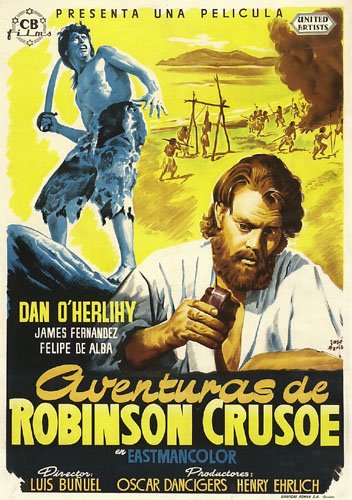
ROBINSON CRUSOE
Mexico, 1954, 90 minutes, Colour.
Dan O'Herlihy, Jaime Fernandez, Felipe de Alba.
Directed by Luis Bunuel.
Robinson Crusoe is one of the many adaptations of Daniel Defoe's story. In later decades Crusoe was to be played by both Aiden Quinn and Pierce Brosnan. Brosnan was Irish, Quinn of Irish descent and played many Irishmen. Peter O'Toole, also Irish, portrayed Robinson Crusoe in Man Friday with Richard Rountree as Friday. In this film, Irish actor Dan O'Herlihy plays Robinson Crusoe and was nominated for best actor for this role. Jaime Fernandez is Friday.
The screenplay was written by Hugo Butler, in English, for Bunuel's first English language film. Butler had been a prolific writer for Hollywood in the 1930s and 1940s with films including Lassie Come Home and The Southerner. However, he and his wife were blacklisted and moved to Mexico where Butler wrote some films for Bunuel and other Mexican directors (including The Young One). In his final years he wrote for Robert Aldritch, Sodom and Gomorrah and The Legend of Lilah Clare.
Luis Bunuel had made an impact with Salvador Dali in the late 1920s with their modernistic art and film, especially Un Chien Andalou. Bunuel moved away from Spain to Mexico, had become an atheist and wanted to move away from Spain, especially in its civil war period. He made many films in Mexico including El and Nazzarin. He returned to Spain in the 1960s and made such classics as The Exterminating Angel, Viridiana, Belle du Jour, Tristana. He continued to make films during the 1970s.
The film highlights some of Bunuel's religious preoccupations, especially in his exploration of the character of Crusoe who begins as a young man, he has a dream sequence which changes him - a dream of his father washing a pig, the allusions to the parable of the Prodigal Son and Crusoe finding a Bible. There are other religious discussions during the film. Bunuel's famous comment on his religious perceptions was, 'Thank God I'm an atheist'.
The film is interesting as an adventure - but also quite profound as an existential exploration of the themes of the shipwrecked civilised man, his encounter with an indigenous native, the exploration of what it was to
be human, to be civilised.
1. The reputation of Defoe's novel? Its popularity throughout the centuries? As a novel for adults, as adapted for younger audiences? The long film tradition and popularity of Robinson Crusoe? Television? Audience expectations at the beginning of this film and treatment of the novel?
2. Expectations from the work of Bunuel? The Spanish director, the surrealist director, the explorer of themes of human nature, society and religion?
3. How interesting was Bunuel’s interpretation and presentation of the traditional story and characters? What was his personal viewpoint on Robinson Crusoe? How was this seen in the style of the film e.g. colour, Mexican island locations, the attention to detail of the island world of Crusoe, the building up of an atmosphere of isolation? The impression of Crusoe's background, capacity for survival, the effect of isolation on him, the meeting with another human being, the building up of trust and affection, returning to the world with this experience? How faithful was Bunuel to the spirit of Defoe?
4. The quality of the acting and Dan O'Herlihy's Oscar nomination for his role? The importance of the audience's awareness of the plot, knowledge of the character and the drama and conflict? Allowing for less element of surprise, how well did Bunuel involve his audience and help them to appreciate plot, character, issues?
5. Robinson Crusoe as a 17th century British character? A type who represented the beliefs of society, human nature and religion of the time? The bluff and cheerful man, the supremacy of the white man and the consequent principles for action? This character being subject to isolation, torment, the need for survival? Did these details appear in Bunuel's interpretation?
6. How archetypal is the figure of Robinson Crusoe? Hero, survivor?
7. How archetypal is the figure of Friday, black, savage, and yet saviour of the white man? The quality of human beings with these two types?
8. Bunuel's insight into Crusoe and the attention to detail in the first half of the film presenting the shipwreck, the loneliness, the details of what Crusoe did to survive, the long period of time, the animals? The effect of isolation and loneliness? Fear, the need for talking, hearing one's own voice? Identity, sexuality?
9. The dramatic impact of the dream sequence and its visual presentation? Crusoe understood within his background, in relationship to his father? What insight did this add to Bunuel's interpretation of Crusoe?
10. Audiences identifying with him and then the discovery of the footprint? The reactions and repercussions? The background of the cannibals, the character of Friday? Black, savage and yet noble?
11. Comment on the detail of the presentation of trust and affection growing between the two men? Their presuppositions, ideas of how to behave? Bonds created, sharing? The fact that no man is an island and that men respond to one another? The qualities of friendship and affection?
12. The tone of the pirate sequences? Dramatically, for the themes, for the bonds between Crusoe and Friday?
13. The appropriateness of the return? To civilisation? What did civilisation and savagery mean by the end of the film? What had happened to both men? How much better wore they for their experience?
14. The film seen as an appropriate presentation of a classical novel? The work of a master cinema artist? Presenting for a 20th century audience a classic story and insight into perennial values?